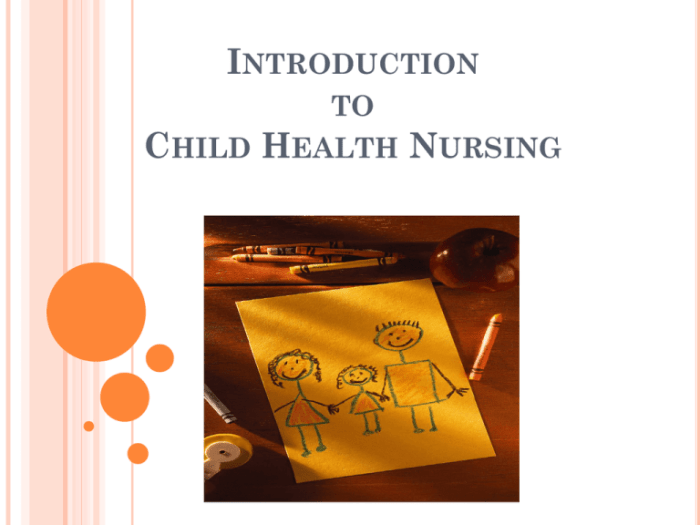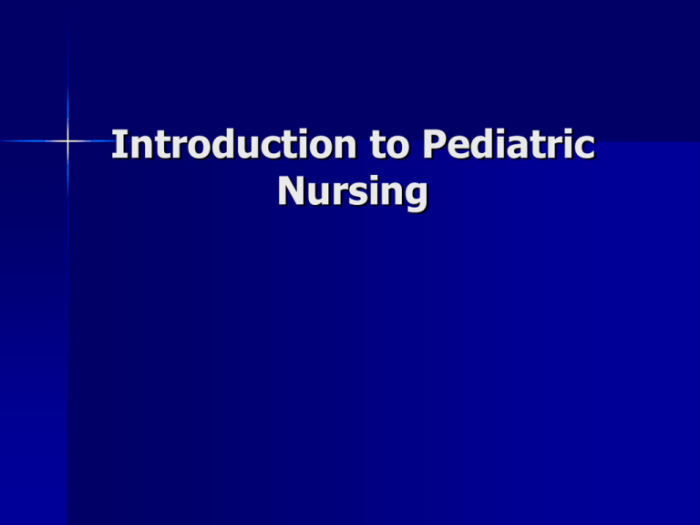Embarking on the journey of pediatric nursing, we delve into the intricacies of providing specialized care for the unique needs of children and adolescents. Introduction to Pediatric Nursing EDAPT unravels the complexities of developmental stages, common illnesses, and essential skills required to navigate this dynamic field.
As we progress, we will explore the fundamental principles of pediatric nursing, empowering nurses with the knowledge and expertise to effectively assess, diagnose, and intervene in various pediatric conditions. Moreover, we will delve into the ethical considerations, interdisciplinary collaborations, and special considerations that shape the practice of pediatric nursing.
Introduction to Pediatric Nursing

Pediatric nursing is a specialized field of nursing that focuses on the care of children and adolescents from birth to young adulthood. Pediatric nurses provide a wide range of services, including health promotion, disease prevention, and treatment of acute and chronic illnesses and injuries.
The unique aspects of pediatric nursing include the developmental stages of children and adolescents, their physical and emotional needs, and the family dynamics involved in their care. Pediatric nurses must have a thorough understanding of these factors in order to provide the best possible care for their patients.
Developmental Stages and Health Needs of Pediatric Patients, Introduction to pediatric nursing edapt
Children and adolescents go through a series of developmental stages, each with its own unique health needs. Pediatric nurses must be familiar with these stages and the associated health risks in order to provide appropriate care.
- Infancy (0-12 months):Infants are at risk for a variety of health problems, including respiratory infections, gastrointestinal problems, and birth defects.
- Toddlerhood (1-3 years):Toddlers are at risk for developmental delays, injuries, and behavioral problems.
- Preschool (3-5 years):Preschoolers are at risk for respiratory infections, dental problems, and behavioral problems.
- School age (6-12 years):School-age children are at risk for injuries, obesity, and mental health problems.
- Adolescence (13-18 years):Adolescents are at risk for a variety of health problems, including sexually transmitted infections, substance abuse, and mental health problems.
Common Pediatric Illnesses and Injuries
Pediatric nurses must be familiar with the common illnesses and injuries that affect children and adolescents. These include:
- Respiratory infections:Respiratory infections are the most common illness in children and adolescents. They can range from mild colds to severe pneumonia.
- Gastrointestinal problems:Gastrointestinal problems are also common in children and adolescents. They can range from mild diarrhea to severe vomiting and dehydration.
- Injuries:Injuries are a leading cause of death and disability in children and adolescents. They can range from minor cuts and bruises to severe head injuries.
- Developmental delays:Developmental delays are a common concern for parents of young children. They can range from mild speech delays to severe intellectual disabilities.
- Behavioral problems:Behavioral problems are also common in children and adolescents. They can range from mild tantrums to severe conduct disorders.
Question Bank: Introduction To Pediatric Nursing Edapt
What are the unique aspects of pediatric nursing?
Pediatric nursing involves caring for children and adolescents, who have distinct developmental needs and health considerations compared to adults.
What are the essential skills for pediatric nurses?
Pediatric nurses require strong communication, assessment, critical thinking, patient education, and family involvement skills.
What are some common pediatric conditions?
Common pediatric conditions include respiratory infections, gastrointestinal disorders, injuries, and chronic illnesses such as asthma and diabetes.
Why is collaboration important in pediatric nursing?
Collaboration among nurses, physicians, social workers, and other healthcare professionals is crucial to ensure comprehensive and coordinated care for pediatric patients.
What are the special considerations in pediatric nursing?
Special considerations include cultural sensitivity, pain management, end-of-life care, and the challenges and rewards of working with pediatric patients and their families.

